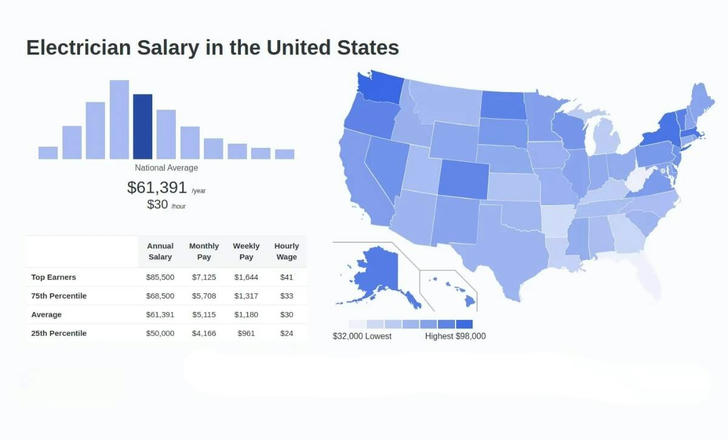⚡ Electrician Jobs in the U.S.: Salary And Benefits You Need to Know
Electrician jobs continue to rank among the most reliable and rewarding skilled trades in the United States. This career offers strong earning potential, high job stability, and a wide range of long-term opportunities. With structured apprenticeships and licensing systems, it’s possible to start with no college degree and work up to a higher position.

✅ Why Choose an Electrician Career?
High Job Demand: Electricians are needed nationwide in residential, commercial, and industrial sectors. Strong Pay Growth: Wages increase with licensing and experience.
Clear Career Path: From apprentice to journeyman to master electrician or supervisor.
Low Entry Barrier: No college degree required; start through apprenticeship or trade school. Diverse Work Options: Work in new construction, repairs, maintenance, or large infrastructure projects. Self-Employment Potential: Licensed electricians can become independent contractors or start their own business.
💵 Average Salaries by City (2024 Estimates)
| City | Hourly Pay | Estimated Annual Pay (Mid-level) |
|---|---|---|
| New York, NY | $32 – $45/hr | $66,000 – $92,000 |
| Los Angeles, CA | $30 – $42/hr | $62,000 – $88,000 |
| Houston, TX | $28 – $40/hr | $58,000 – $84,000 |
| Chicago, IL | $29 – $41/hr | $60,000 – $86,000 |
| Atlanta, GA | $25 – $38/hr | $52,000 – $79,000 |

📌 Licensed electricians often earn more, especially those with commercial or industrial specialization.
🎁 Common Benefits Offered
Health Insurance: Includes medical, dental, and vision (especially in union-backed roles) Paid Time Off: Vacation days, holidays, and sick leave
Tools & Equipment: Employers often provide safety gear and necessary tools
Travel Reimbursement: Mileage or lodging reimbursements for job-related travel
Retirement Plans: 401(k) or pension plans available through many employers or unions
Training Support: Opportunities to pursue continuing education and license renewal
👥 Suitable for All Ages
Electrician work offers entry and re-entry points for a wide range of age groups:
| Age Group | Why It Works |
|---|---|
| 18–25 | Ideal for starting through apprenticeship and learning a trade on the job |
| 26–40 | Opportunity to switch careers, pursue long-term income growth |
| 41–55 | Leverage experience for management or contractor-level roles |
| 56+ | Shift toward supervision, estimating, or part-time roles with reduced labor |
🔧 What Do Electricians Do?
Electricians install, maintain, and repair electrical systems in homes, businesses, and industrial environments. Typical responsibilities include:
• Reading blueprints and wiring diagrams
• Installing outlets, switches, circuit breakers, and lighting
• Performing inspections and troubleshooting electrical issues
• Ensuring compliance with the National Electrical Code (NEC)
• Coordinating with contractors and project managers on job sites
• Using tools like multimeters, conduit benders, and voltage testers
🎓 Requirements & Path to Entry
Entry into the trade typically begins through a paid apprenticeship program, combining classroom instruction with hands-on work. After gaining sufficient experience, individuals must pass a state-required licensing exam to become a journeyman or master electrician, depending on the jurisdiction. Valid work authorization is essential, and many employers may also require safety certifications such as OSHA 10/30, NCCER credentials, or state-specific compliance courses.
🔁 Career Pathway:
Apprentice – Learn while working under licensed professionals
Journeyman Electrician – Licensed to work independently
Master Electrician – Supervise, estimate, and sign off on large projects
Supervisor or Contractor – Manage teams or start a business
🔍 Where to Find Electrician Jobs
• Job Boards: Indeed, ZipRecruiter, SimplyHired, CareerBuilder
• Union Programs: IBEW (International Brotherhood of Electrical Workers) local chapters
• Training Organizations: NCCER, NECA, state apprenticeship boards
• Top Employers: Rosendin, Mr. Electric, Bergelectric, Cummings Electrical
✅ Final Thoughts
Electrician jobs are more than just technical work — they’re a long-term career path with strong income potential and room for growth. Whether you're just starting out or looking to switch into a skilled trade, this field rewards precision, problem-solving, and reliability. With demand growing across the country, now is a great time to explore opportunities in the electrical field.
